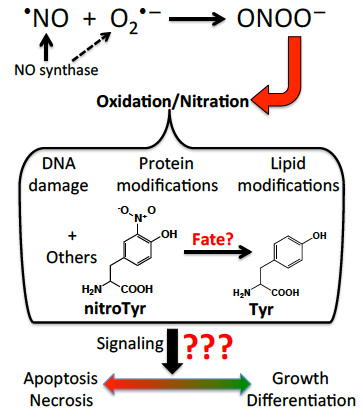Encoding Oxidative Stress
Encoding Oxidative Stress
Genetic code expansion technology is a key tool for advancing our understanding the role of oxidative stress modification to proteins in biology. A method to produce homogeneously proteins modified with the post translationally modified forms of oxidative damage is essential for determining the mechanistic consequences of oxidative stress. Measurement of increased nitration of tyrosine has shown that peroxynitrite and other reactive nitrogen species are produced in at least 80 major human diseases. Mass spectrometry has established that specific tyrosines on certain proteins are far more vulnerable to nitration in vivo. However, it has been impossible until now to determine whether tyrosine nitration at a specific site directly causes pathology because of the multiplicity of oxidative modifications of proteins produced by peroxynitrite and other strong oxidants. To develop and evaluate tools for genetically encoding oxidative damage we have focused our initial studies on tyrosine nitration and aim to answer four simple questions.
1. Are nitrated tyrosines effecting protein function? (Genetically Encoding Protein Oxidative Damage. 2008. J. Am. Chem. Soc. 130(12), 4028-4033)
2. Are nitrated tyrosines providing a protein “gain of function” that leads to a disease state? (Nitration of Hsp90 induces cell death. 2013. PNAS 2013, 110(12) E1102-E1111.)
3. Is protein tyrosine nitration part of a cellular signaling system? (in progress)
4. Is protein tyrosine nitration a player in phospho-tyrosine regulation? (in progress)

Figure. 1. Nitrotyrosine formation on proteins is the footprint of peroxynitrite exposure and can lead to a wide spectrum of changes in cellular functions.